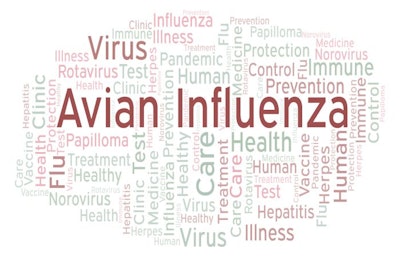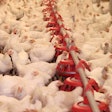
In the past week, the number of highly pathogenic avian influenza (HPAI) outbreaks in European poultry flocks has risen by 10 to 378.
This is according to the Animal Disease Notification System of the European Commission (EC) in its latest update to December 13. This total includes 273 outbreaks in Hungary, 32 in Poland, and nine in Bulgaria that occurred prior to the autumn/fall.
Including a first outbreak in the Republic of Ireland, 11 European states have now registered at least one HPAI outbreak in poultry for this winter season. Over the past week, four more outbreaks were registered in France, two each in The Netherlands and Poland, and one in Ukraine.
Four European countries record new HPAI cases in poultry
The first cases of H5N8 HPAI among poultry in the Irish Republic have been confirmed to the World Organisation for Animal Health (OIE) over the past week. Five cases were detected among a flock of 127 free-range turkeys in County Wicklow in the southeast of the country, according to the agriculture department’s report.
Over the past week, the French ministry of agriculture has registered three new outbreaks of HPAI in poultry to the OIE. The H5N8 virus variant was detected in two duck flocks in western France — departments of Vendée and Deux-Sèvres — and in a mixed poultry flock in Landes. Around 14,300 birds were directly impacted in these outbreaks, and all flocks have been culled.
In November, France registered its first HPAI cases of the season. Early outbreaks occurred in pet shops and similar outlets on the island of Corsica and a Paris suburb. During the early days of this month, first cases were detected among commercial poultry — at two duck farms in the southwestern department of Landes.
In its latest report to the OIE, the agriculture department (Defra) of the United Kingdom (U.K.) has recorded three further outbreaks of HPAI in poultry. Presence of the H5N8 variant was confirmed in a second flock in Northallerton (North Yorkshire), as well as two locations in the eastern county of Norfolk (Snetterton and King’s Lynn). More than 84,000 birds — all meat turkeys — were directly involved in these outbreaks, including more than 79,000 culled.
Since its OIE report, Defra has confirmed a further outbreak. At premises near Willington in Derbyshire, a mixed flock of poultry and captive birds has tested positive for the virus. This brings the U.K’s total outbreaks in domestic birds so far this winter to 10.
In Russia, the number of HPAI outbreaks in poultry since September has risen to six, involving a total of over two million birds.
The latest to be infected with the H5N8 virus variant was a farm with more than 816,600 poultry in Astrakhan oblast, according to the agriculture ministry’s latest report to the OIE. Eighteen birds died, but the fate of the rest of the flock is not disclosed.
This was the first HPAI outbreak in this oblast, and in the Volga federal district. Previous cases in Russia this winter were in Rostov oblast (Southern federal district), and Karachay-Cherkess Republic (North Caucasus).
In The Netherlands, a low-pathogenic avian influenza (LPAI) virus of the H5 family was detected in a poultry flock for the first time since 2018. According to the official report to the OIE, there were a number of cases at a farm in South Holland province earlier this month. All the birds there have been culled to prevent further spread of the infection.
Sharp rise in HPAI cases in European wild birds
The number of confirmed outbreaks of HPAI among wild birds in Europe has reached 613. This is the total for the year to December 13, according to the EC’s notification system. Compared to the previous week, this represents an increase of 106.
Recording the most cases so far has been Germany, with a total of 381 outbreaks — 25 more than the previous week’s update. Now with 59 confirmed outbreaks in wild species, the highest weekly increase (48) was in the U.K.
Also registering new cases over the past week through the EC system were Belgium, Denmark, France, Republic of Ireland, Italy, Norway, Poland, Slovenia, and Sweden.
So far this winter, five European states have reported HPAI in captive birds. Over the past week, first cases in this category have been confirmed in Belgium, Denmark, and Norway. The Netherlands has added two outbreaks to its total in the same period, and there has been one additional outbreak in the U.K.
Avian influenza situation in Asia
Over the past week, Taiwan’s Council of Agriculture has informed OIE about four outbreaks of HPAI in poultry during November.
The H5N5 virus variant was detected in two small groups of native chickens at different slaughterhouses in Taipei and New Taipei City. After a spike in mortality, the same virus was detected in two flocks of meat geese — one in Chiayi City, and one in Yunlin county. In total, around 2,900 poultry were involved in these outbreaks. Half of the birds died.
The first occurrence of this virus subtype in Taiwanese poultry was in September of 2019. Bringing the territory’s total outbreaks since then to 52, the latest cases are the first since September of this year.
In South Korea, two outbreaks linked to the H5N8 have been registered with the OIE earlier this month. Affected were a flock of 188,000 poultry in North Gyeongsang province in the east of the country, and another of almost 10,000 meat ducks in the southwestern province of South Jeolla.
After an absence of two-and-a-half years, this virus returned to the country’s poultry flocks during November. Presence of the same virus variant has also been detected among wild birds at 25 locations in South Korea since the end of October.
In the second week of December, a further outbreak of HPAI linked to the H5N8 virus was confirmed in Israel. Affected was a flock of 18,500 meat turkeys in the district of Jerusalem. This outbreaks brings the country’s total since October to 11, with more than 338,000 poultry lost through mortality or culling.
Last month, the same virus variant was detected among wild birds in Iran. Three swans found dead in the north of the country had tested positive, following previous detections at two national parks in the west and northwest.
China has confirmed its first detection of the H5N8 HPAI virus in a wild bird of the winter. At the end of November, some swans found sick or dead in the city of Yuncheng in Shanxi province tested positive for this variant, reports the agriculture ministry.
Avian flu situation partially resolved in Australia
Earlier this year, six outbreaks of avian influenza were reported in Australian poultry flocks. All occurred in the state of Victoria. During the month of August 2020, an LPAI virus of the H5N2 family was detected at two farms, and presence of H7N6 variant was confirmed in a commercial emu flock. As surveillance has revealed no further cases since that time, the country’s agriculture department has declared to the OIE that the situation has been resolved.
At around the same time, an HPAI virus of the H5N7 family was detected in three layer flocks in the state. In the past week, the national veterinary authority has reported to the OIE that no further cases have been detected.
In the past week, South Africa’s animal health agency has confirmed to the OIE that there have been no new cases of HPAI. The H5N8 HPAI was first detected in the country in June of 2017. Since that time, the number of outbreaks has risen to 218. With the majority of recent cases in commercial ostrich flocks, no new outbreaks have been detected since June of this year.
Two biotech companies have recently announced a groundbreaking project to harness emerging gene editing technology to develop genetic resistance against avian flu in chickens.
View our continuing coverage of the global avian influenza situation.

















